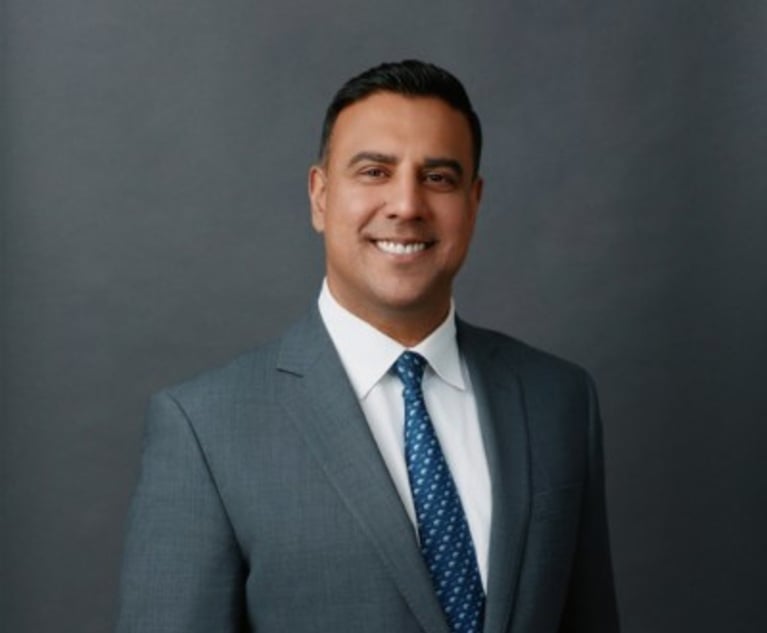Clifford Chance prepares for the future with new strategy and management roles
New strategic plan to focus on innovation as firm prepares to meet tomorrow's client needs with two new management appointments
January 19, 2015 at 07:08 PM
4 minute read
Clifford Chance (CC) has made two senior appointments as managing partner Matthew Layton (pictured) has unveiled a new strategic plan that puts innovation and change at the centre of the firm's future.
Caroline Firstbrook is set to join the firm next month as chief operating officer, succeeding Amanda Burton who left at the end of last year.
Firstbrook, who will lead the firm's global operations team including more than 3,000 business services staff, was most recently running her own consultancy, having previously worked at Accenture where she led a 1,000 person strategy practice across Europe, Latin America and Africa. She previously worked as a strategy consultant at management consultancy Monitor.
Her appointment comes as Bas Boris Visser, managing partner of CC's Amsterdam office, takes up a new role as global head of innovation and business change. The position, which he will hold in addition to his local leadership post, will see him focus on shaping the firm's strategy around changes in the legal market, including technological developments and new market entrants.
Both Visser and Firstbrook will sit on the recently formed executive operations group chaired by Layton, which will oversee the operations side of the business.
The appointments come as Layton this week announced details of the firm's new strategic vision to staff. The plan is intended to align CC with changes in client demands in the face of macro-economic trends such as shifting demographics and markets, increased regulation and risk, technological developments, new service models and continued pressure on external legal budgets.
The vision sees the firm set out to be "the global law firm of choice for the world's leading businesses of today and tomorrow".
In addition to building its existing presence in key financial centres across Europe, the US and Asia Pacific, the firm will invest in growing its presence in Africa and Latin America though it has no specific office openings planned at present.
Key to the new strategy will be investment in technology and more flexible ways of working, possibly through tie-ups with external providers such as outsourcers. The firm will also review its transactional support centre, currently based in India, with all options open for consideration – including an additional support office in a different location.
The firm will also invest further in its continuous improvement initiative which has so far improved efficiency across more than 100 different projects. As part of this CC has already started talking to clients about extending the offering into their businesses.
Other areas potentially up for change include the firm's lockstep remuneration model, witih the firm set to look at flexibility within the system, as well as more generally looking at monitoring lawyer performance in line with the new strategy.
The firm's existing sector focus will remain unchanged, while clients will continue to fall into three key groups: financial investors, corporates and banks.
Layton and other members of the executive operations group – put together in October- are now presenting the plan to staff globally, while regional and practice group leaders will start detailed planning and implementation.
Commenting on the plans Layton said: "We're operating in a hugely dynamic market which will continue to see rapid developments over the next decade and beyond. Our goal is to be the global law firm of choice for the leading businesses of today and tomorrow. This vision is a 10-year vision and will stand the test of time."
This content has been archived. It is available through our partners, LexisNexis® and Bloomberg Law.
To view this content, please continue to their sites.
Not a Lexis Subscriber?
Subscribe Now
Not a Bloomberg Law Subscriber?
Subscribe Now
NOT FOR REPRINT
© 2025 ALM Global, LLC, All Rights Reserved. Request academic re-use from www.copyright.com. All other uses, submit a request to [email protected]. For more information visit Asset & Logo Licensing.
You Might Like
View All
Rosenblatt Breaks Away From RBG, Becomes 40-Strong Standalone Firm

Eversheds Sutherland Outgoing Co-CEO to Move to Dubai to Spur Regional Growth
2 minute read
More than Half of South Australian Lawyers Report Suffering Harassment
3 minute readTrending Stories
- 1The Law Firm Disrupted: Scrutinizing the Elephant More Than the Mouse
- 2Inherent Diminished Value Damages Unavailable to 3rd-Party Claimants, Court Says
- 3Pa. Defense Firm Sued by Client Over Ex-Eagles Player's $43.5M Med Mal Win
- 4Losses Mount at Morris Manning, but Departing Ex-Chair Stays Bullish About His Old Firm's Future
- 5Zoom Faces Intellectual Property Suit Over AI-Based Augmented Video Conferencing
Who Got The Work
J. Brugh Lower of Gibbons has entered an appearance for industrial equipment supplier Devco Corporation in a pending trademark infringement lawsuit. The suit, accusing the defendant of selling knock-off Graco products, was filed Dec. 18 in New Jersey District Court by Rivkin Radler on behalf of Graco Inc. and Graco Minnesota. The case, assigned to U.S. District Judge Zahid N. Quraishi, is 3:24-cv-11294, Graco Inc. et al v. Devco Corporation.
Who Got The Work
Rebecca Maller-Stein and Kent A. Yalowitz of Arnold & Porter Kaye Scholer have entered their appearances for Hanaco Venture Capital and its executives, Lior Prosor and David Frankel, in a pending securities lawsuit. The action, filed on Dec. 24 in New York Southern District Court by Zell, Aron & Co. on behalf of Goldeneye Advisors, accuses the defendants of negligently and fraudulently managing the plaintiff's $1 million investment. The case, assigned to U.S. District Judge Vernon S. Broderick, is 1:24-cv-09918, Goldeneye Advisors, LLC v. Hanaco Venture Capital, Ltd. et al.
Who Got The Work
Attorneys from A&O Shearman has stepped in as defense counsel for Toronto-Dominion Bank and other defendants in a pending securities class action. The suit, filed Dec. 11 in New York Southern District Court by Bleichmar Fonti & Auld, accuses the defendants of concealing the bank's 'pervasive' deficiencies in regards to its compliance with the Bank Secrecy Act and the quality of its anti-money laundering controls. The case, assigned to U.S. District Judge Arun Subramanian, is 1:24-cv-09445, Gonzalez v. The Toronto-Dominion Bank et al.
Who Got The Work
Crown Castle International, a Pennsylvania company providing shared communications infrastructure, has turned to Luke D. Wolf of Gordon Rees Scully Mansukhani to fend off a pending breach-of-contract lawsuit. The court action, filed Nov. 25 in Michigan Eastern District Court by Hooper Hathaway PC on behalf of The Town Residences LLC, accuses Crown Castle of failing to transfer approximately $30,000 in utility payments from T-Mobile in breach of a roof-top lease and assignment agreement. The case, assigned to U.S. District Judge Susan K. Declercq, is 2:24-cv-13131, The Town Residences LLC v. T-Mobile US, Inc. et al.
Who Got The Work
Wilfred P. Coronato and Daniel M. Schwartz of McCarter & English have stepped in as defense counsel to Electrolux Home Products Inc. in a pending product liability lawsuit. The court action, filed Nov. 26 in New York Eastern District Court by Poulos Lopiccolo PC and Nagel Rice LLP on behalf of David Stern, alleges that the defendant's refrigerators’ drawers and shelving repeatedly break and fall apart within months after purchase. The case, assigned to U.S. District Judge Joan M. Azrack, is 2:24-cv-08204, Stern v. Electrolux Home Products, Inc.
Featured Firms
Law Offices of Gary Martin Hays & Associates, P.C.
(470) 294-1674
Law Offices of Mark E. Salomone
(857) 444-6468
Smith & Hassler
(713) 739-1250









